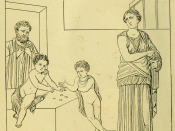People are ruled by passions every day of life. Everyone would like to be calm and decisive, but sometimes people cannot help to be influenced by their emotions. Euripides' play, Medea, shows us this passion. Throughout the play, the characters are unmistakably ruled by their emotions. The outcomes of each of them derive from the way they handle and deal with these emotions. They get into the situation that they're in through passion, and they must get out the same way. In Euripides' Medea, people are ruled by their passion for something; the greatness attained through one's own passions, the errors in one's ways, and the eventual downfall because of these passions are all consequences of being hauled around by one's own emotions.
One achieves greatness through how they act. Sometimes, though, greatness can be mixed in with non-grateful acts. A perfect example of this type of greatness would be the character of Medea.
The audience feels that she is great not because of the big picture, (going on a killing spree), but because of the little things that can be seen behind all that is going on. Even though she still seems evil for plotting these horrible deeds, it is evident that she has a just cause. Determination in Medea is seen through her saying, "Death take you, with her father, and perish his whole house!"� What a thing to say to your own children! Only a woman with the most of courage would say such a thing. Admiration for Medea is also evident as she concludes, "Yes, I can endure guilt, however horrible; the laughter of my enemies I will not endure."� In other words, Medea would like more to be hated by her enemies rather than to be mocked by them. Another, but much smaller example of greatness that the audience feels toward is Jason. He never loses his cool in the heat of the play and remains calm and logical. Though, with this greatness comes the overpowering errors that are seen in this play.
A play such as Medea would not be complete or even close to magnificent at all without the characters having some flaw. Medea is a play that lacks any self-conscious recognition of error by its characters; no one develops a mature perspective on their own actions. Right off the start, Creon makes a mistake that would soon prove to be fatal by saying, "I'm no tyrant by nature. My soft heart has often betrayed me; and I know it's foolish of me now; yet none the less, Medea, you shall have what you ask."� Creon does not know how right he is; his easy nature will betray he and his loved ones. In Jason's case, perhaps Medea may go easier on him if he would just admit to his wrongdoings. As for Medea, she definitely lets her emotions get in the way of her thoughts. Because of this, it drives her into a killing spree of which she will not pull out of. The characters of Medea are seen to abandon their responsibilities as a result of following their emotions. Probably the most visible signs of abandoned responsibility are the children, who are used in a murder plot, then murdered themselves. Inevitably, the errors that one portrays will eventually lead to their failure and downfall.
This play is full of losses and grievances to all the characters. Although Medea seems victorious at the end of the play, she still has to live with the loss of her children and former life. She has turned into a merciless killer because she blindly follows her raging passions. Now Medea accepts that, "anger, the spring of all life's horror, masters my resolve."� Even her friends fear her. This is seen by the Nurse saying, "God grant she strike her enemies and not her friends!"� Jason played a big part in now what is a tragedy and did not even realize his ways. Now he must live with the loss of all of his loved ones. Because of the characters' failure of control over themselves, they are doomed forever and must live on.
Once a person is being ruled by their passions, they are at the point of no return. It either turns out for the best, or in the case of Euripides' Medea, for the worst. The characters let their emotions run their lives to the point where they are eventually going to fall. In order to be in control of one's self, you must first take control of one's emotions. If they do not, then they will eventually fall into the life that Medea led.





